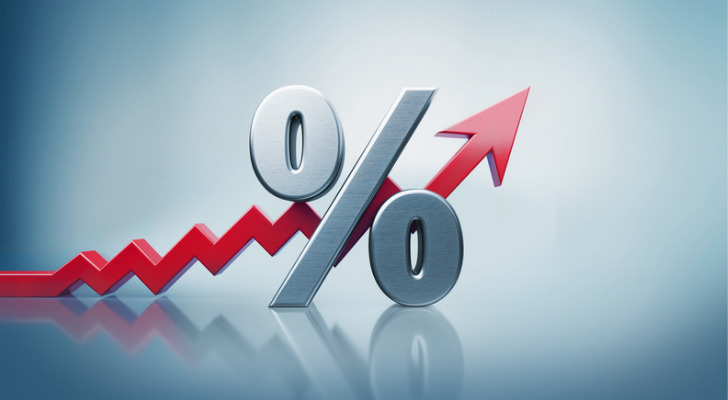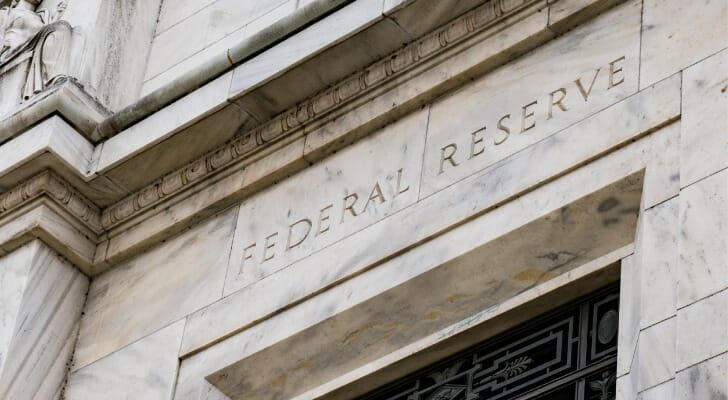There are a number of stories which have dominated economic news in 2022 such as inflation, the emergence of a bear market and a possible recession. Arguably the most impactful news, though, has been one coming directly from the federal government — a series of sharp interest rates hikes. These rate hikes tie together a number of the other bits of economic news. They are in response to rising inflation and could increase the chances of the economy entering a full-on recession.
For help managing your own portfolio through these difficult times, consider working with a financial advisor.
Interest Rates Basics
The Federal Reserve is the central banking system of the U.S., and it establishes the national interest rate at which banks trade balances. Though these are not binding to independent banks, most banks set their prime rates with the Fed’s rate at least partly in mind.
The rate has fluctuated through the years. In the 1980s, it went as high as 20%, a response to the inflation caused by the U.S. decision to go off of the gold standard. After the recession caused by the credit crisis in late 2008, it was set at between 0% and 0.25% and stayed there for a number of years before finally going up again in the latter half of the 2010s. Rates plummeted back towards 0% during the COVID-19 crisis before once again spiking 2022.
Federal Reserve Interest Rates in 2022

As noted above, the Federal Reserve has raised interest rates numerous times in 2022 — in fact, there were hikes announced at five straight meetings, the most activity from the organization in years.
The Fed may not be done yet, either. It seems likely that interest rates will go up again in November, and the Fed may make even more hikes in 2023.
There are a number of reasons why the Fed is raising rates, but the biggest is that raising interest rates is a tool to fight inflation. Higher interest rates makes money harder to come by for Americans looking to get loans, therefore reducing the amount of money in circulation, which helps to ease inflation. With inflation higher than is has been in decades, the Fed chose to be fairly aggressive in its efforts to combat it.
How Rising Interest Rates Impact People
While rising interest rates may seem fairly esoteric and not directly connected to your daily life — unless, of course, you’re thinking about borrowing money to buy a home or some other major purchase — it could have a bigger impact on your life than you think.
For one thing, it’s widely accepted that raising inflation makes it more likely that the U.S. will enter a full-on recession. Raising interest rates slows down the economy in general, and one of the unintended consequences can be negative economic growth, and two straight quarters of negative economic growth is considered a recession.
Another unintended consequence is that the U.S. dollar is valued at historically high levels against foreign currencies including the British pound and the euro. This makes holding cash a more attractive option for investors, and potentially makes traveling more affordable as your dollars will be more valuable overseas than they were a year ago.
A final impact is that consumers can get better rates for savings. Interest rates for certificates of deposit, for instance, are higher and could get even higher. This makes certain savings strategies — such as building a CD ladder — a better option for those looking for a safe place to park cash.
The Bottom Line

Interest rates have gone up a number of times in 2022 and could continue to increase for the rest of the year and into 2023. This has a number of impacts on the economy and individuals, with both positive and negative externalities.
Savings Tips
- A financial advisor can help you navigate the world of rising interest rates. Finding a qualified financial advisor doesn’t have to be hard. SmartAsset’s free tool matches you with up to three financial advisors who serve your area, and you can interview your advisor matches at no cost to decide which one is right for you. If you’re ready to find an advisor who can help you achieve your financial goals, get started now.
- If you’re considering investing in a certificate of deposit to take advantage of the rising interest rates, check out current rates and shop around before you choose an institution.
Photo credit: ©iStock.com/pabradyphoto, ©iStock.com/MicroStockHub, ©iStock.com/gopixa
